‘Cheated’: Aussies call out Facebook for allegedly failing to remove scam posts
Seemingly innocent posts are seeing scammers net tens of thousands of dollars from everyday Aussies, and anyone could fall for it.
Fed-up Aussies are calling on Facebook to remove scam posts after they lost hundreds of dollars to fake online ads, which they claim remained on the social media platform even after they were reported.
Lindsay, from Melbourne, said she’s been frustrated by the social media giant’s inaction after she reported an ad that swindled her out of nearly $300 in May.
At the time, Lindsay, in her 50s, was scrolling through Facebook when she came across a post advertising a Smeg kettle as part of a fake Mother’s Day promotion through Coles.
The post claimed the supermarket had an oversupply of kettles and was giving away the popular appliance – which can retail for up to $300 – for free as long as users paid $3 for postage.
“I thought it must be legit,” Lindsay told news.com.au, adding there were no warning signs at the time.
“Everyone in the comments was saying ‘I’ve done this, it arrived quickly. I’m absolutely thrilled’.”
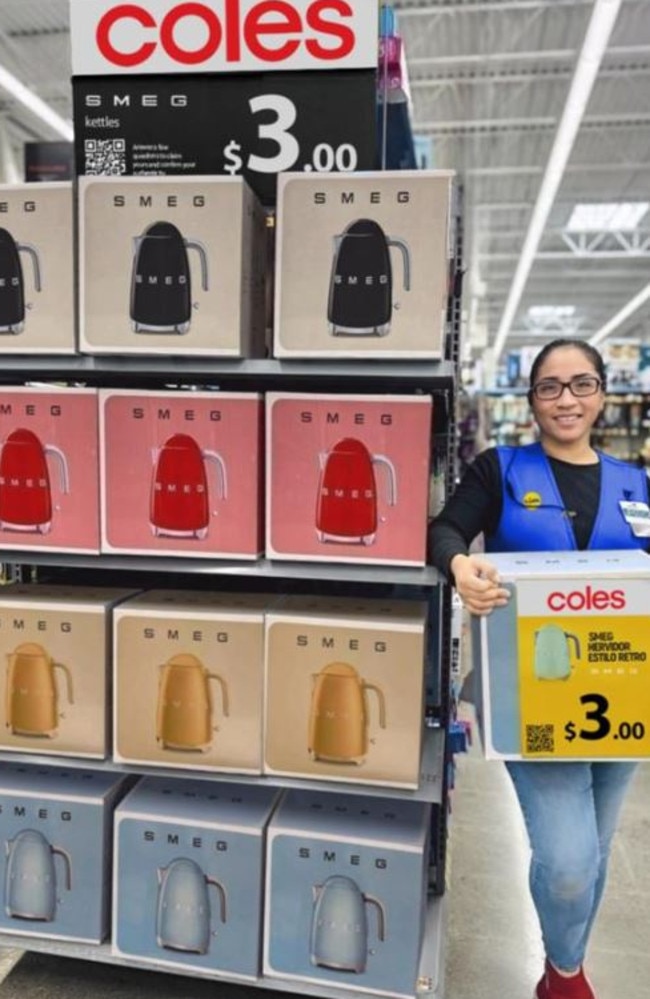
But after clicking on the link and entering in her credit card details, Lindsay immediately felt something was wrong.
“I thought in that moment, ‘this is stupid, what have I done?’ Then I checked my credit card statement on my phone,” she explained.
Instead, of the small $3 postage fee, $282 had been taken out of Lindsay’s account.
“I felt sick and I felt so stupid that I allowed it to happen,” she said.
Panicked, she quickly contacted her bank before reporting the post to Facebook later that day on May 5, fearing others would fall victim to the same scam.
She later received an automated message from Facebook claiming the post was not a scam.
“I tried again but you can’t have any dialogue with them or write any comments. Each time they just come back saying, ‘No, it’s not a scam’.”
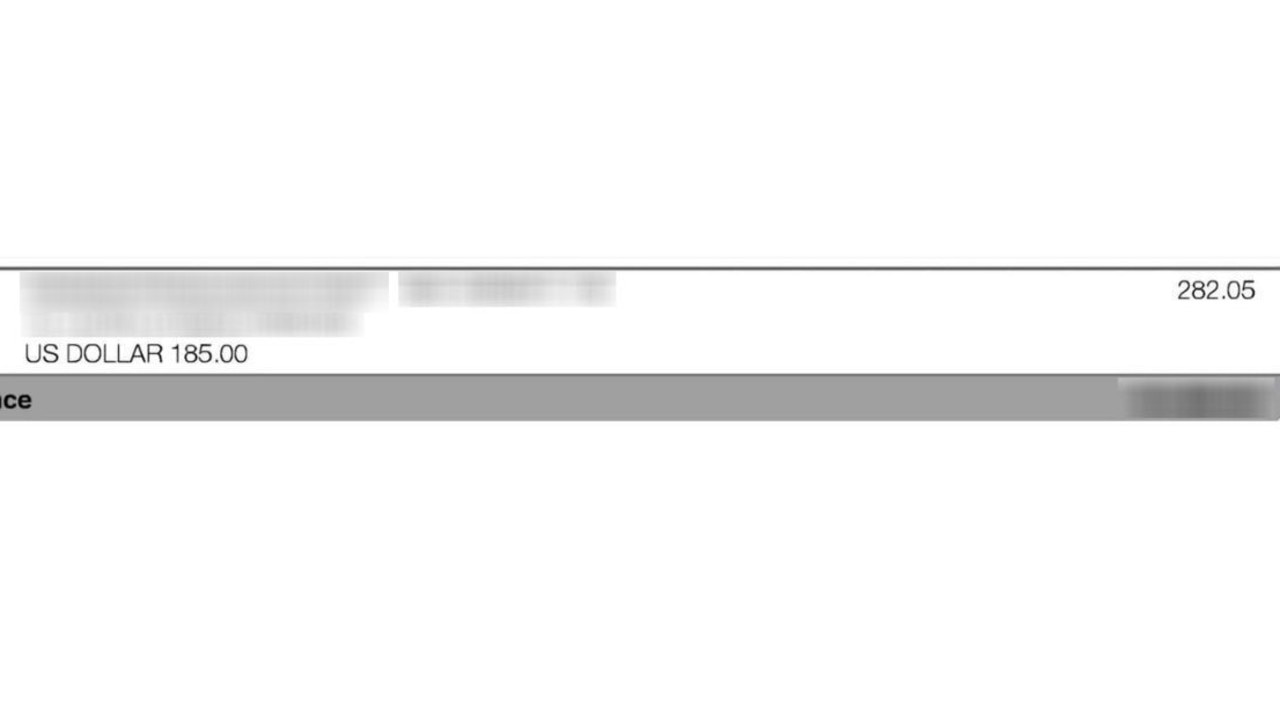
A week later, on May 12, Lindsay reported the post again after it reappeared on her Facebook.
But after making a total of six reports across May 5 and May 12, she kept receiving the same response.
“There’s nothing else I can do,” she said. “It’s a very limited, restrictive process.”
Lindsay, who is waiting to hear if her bank will grant her a refund, said Facebook needs to improve the way its investigates scams.
“It’s so obvious it was just a bot and that nobody investigated,” she said. “Nothing happened, nothing was done.”
Coles, which was in no way involved in the scam, advises customers to be aware of “competitions and other unsolicited communications that use the Coles brand without Coles’ permission, or which promote Coles rewards in an attempt to appear legitimate”.
“These offers predominantly attempt to collect your personal details or financial information and Coles will never request personal or banking details in unsolicited communications,” a spokesman told news.com.au.
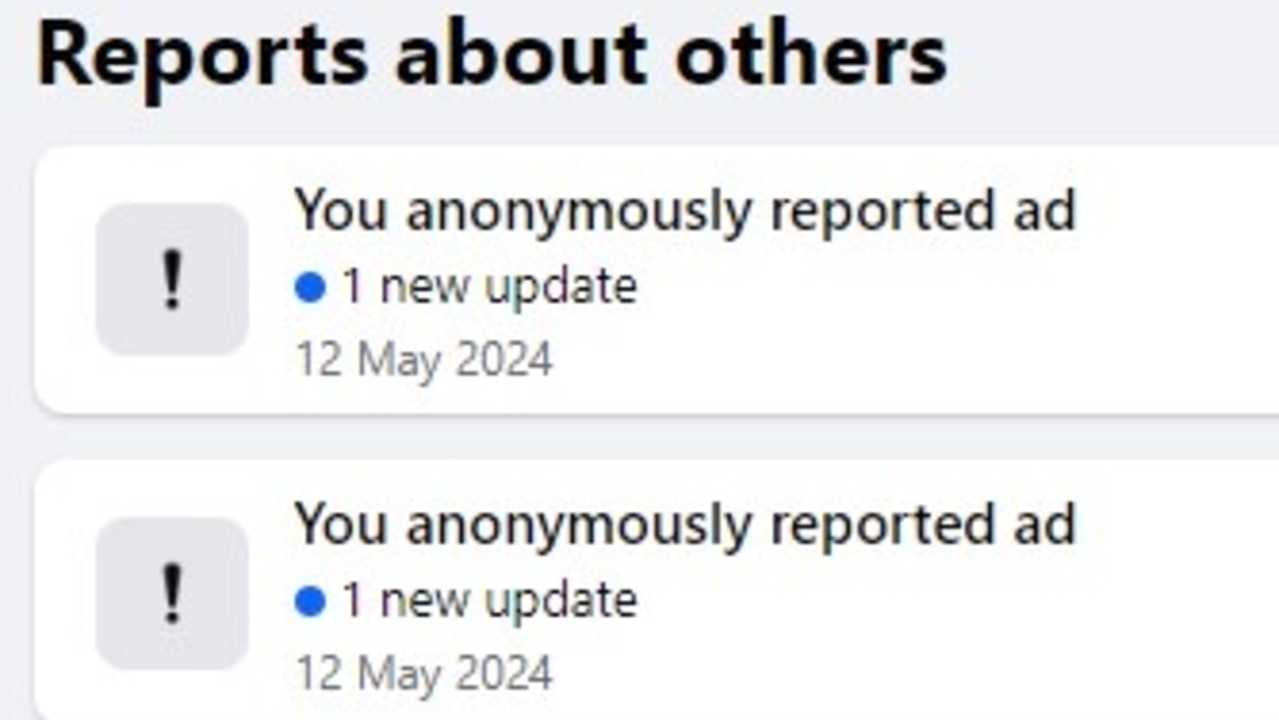
‘Well orchestrated scam’
Andrea Saunders from Perth fell for a similar scam in November 2022.
At the time, the 60-year-old came across a Facebook ad selling clothes at an 80 per cent discount, claiming to be sourced from a Country Road Factory Store.
“Everything Must Go. Package Location Tacking Online. 3-5 Days Delivery Guarantee or Full Refund. Get Yours before out of stock,” the post, shared by Facebook user CRClearnace Onlineshop, read.
The ad also claimed customers would receive a $50 discount for purchases over $150 – a deal Andrea described as “the big bait”.
“I fell for it, hook, line and sinker and so did many of my friends,” she told news.com.au.
As was the case with Lindsay, Andrea didn’t spot any warning signs, explaining the post initially “looked very genuine”.
She placed an order for $199 for hoodies, a cap and a bag, qualifying her for the $50 discount, and received a legitimate-looking email confirming the order.
She didn’t realise she had been scammed until two days later when she clicked on a tracking link she was emailed and received an ‘error 404 message’.
“I felt like an idiot. You’re always reading about people (being scammed) and you think ‘Oh my God how did you fall for that?’ But this one was well orchestrated, it looked good.”
The 60-year-old contacted her credit card provider and later received a full refund from the scam.
But when she tried to report the post to Facebook on November 18, she claimed she didn’t receive a response.
“I heard nothing back.”
With the ad continuing to appear on her Facebook feed, she decided to comment on the post to warn others.
“The ad came up on my Facebook feed all the time. So every time it came up, I would put an emoji face and say ‘this site is a scam’.”
But even then, her comments would end up being removed.
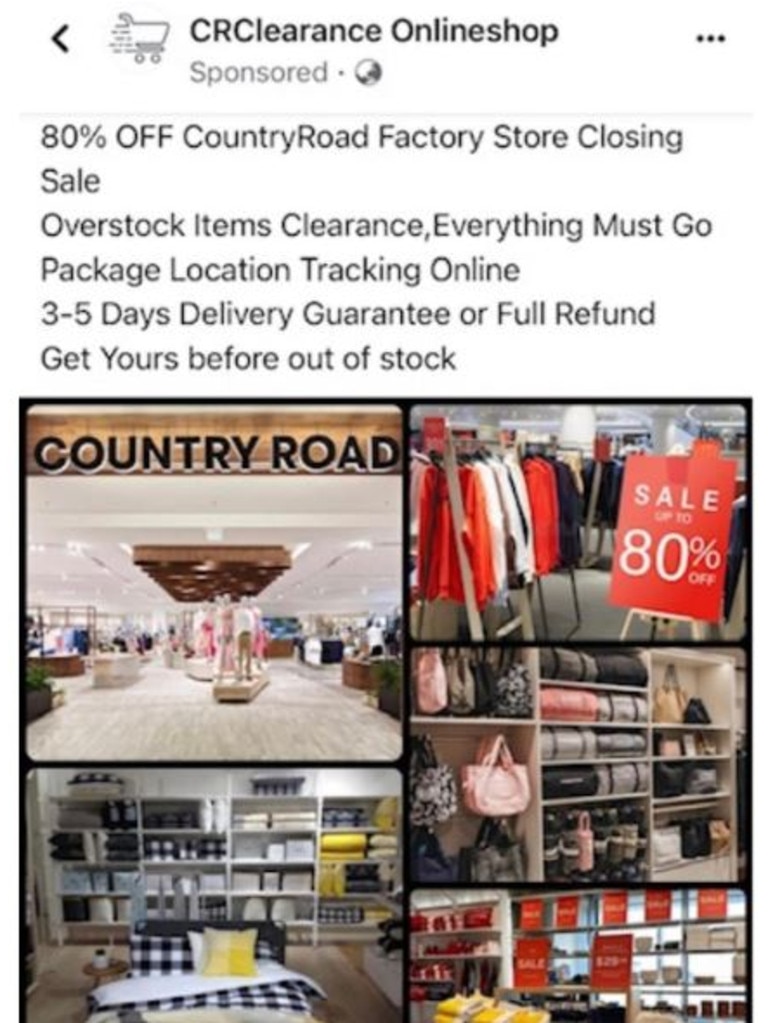
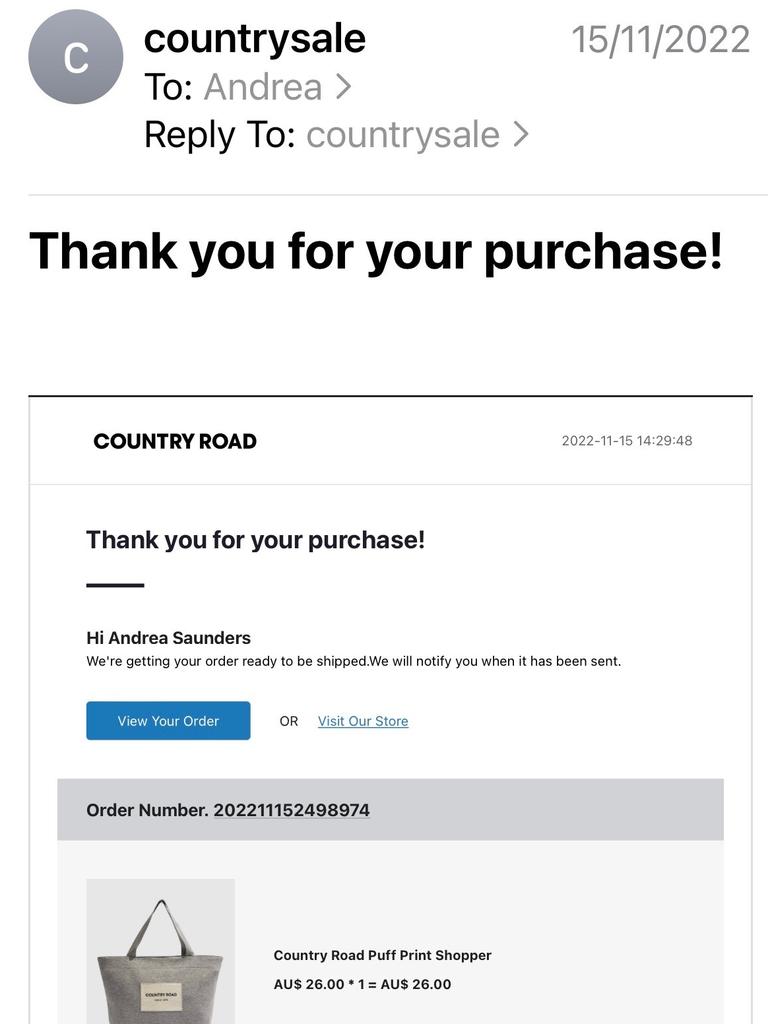
Andrea was thankfully able to stop at least one person from falling victim to the scam, when her friend called her on the phone and mentioned the deal.
“She was halfway through doing her order. And I said, No, no, no, it’s a scam. And she’s no, it’s not. It looks really legitimate. And I said, no, definitely it’s a scam.”
However five of her other friends weren’t as lucky.
When Lindsay later searched the email address which sent her the order confirmation email, she found the address has ben linked to other scams online.
According to cybersecurity community “MalwareTips”, Info@mallhelpcenter.com has been
“associated with numerous scam shopping websites”.
“These fraudulent sites typically sell apparel, shoes, jewellery, and electronics at unbelievably huge discounts of up to 90 per cent off,” the website warns.
“They rely heavily on Facebook and Instagram ads to drive traffic to their sites. The ads showcase high-quality products like electric bikes, branded clothing and shoes at incredibly low prices to lure customers.”
News.com.au has contacted Info@mallhelpcenter.com for comment.
At the time of publication, CRClearance Onlineshop still has an active page on Facebook, despite news.com.au bringing it to their attention.
Lindsay is calling on Facebook to employ a screening process for users who place ads.
“I feel almost cheated. They’re such a big platform and they’re so influential that I think that they should be more responsible and selective when they allow ads,” she said.
“I think Facebook needs to be accountable.”
Country Road, which was not involved in the scam, said it was aware of a recent rise in internet scams involving the use of its name and logo.
“These schemes target people using a range of different tactics such as fraudulent websites, fake emails, Facebook pages, text messages and more,” the company said in a statement to news.com.au.
“At Country Road, we want to ensure customer safety when engaging with our brand.”
It noted it has shared information on how to ensure they are purchasing authentic Country Road products on their social media channels and website.
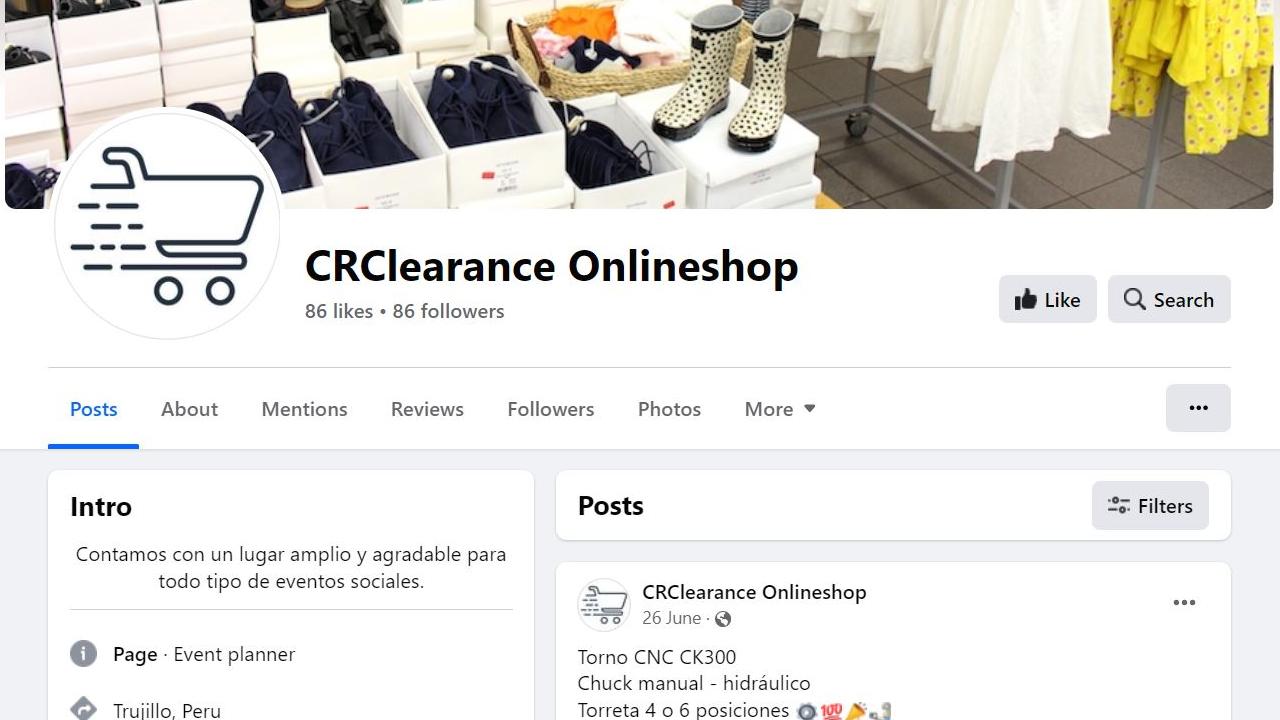
Consumer advocate Adam Glezer from Consumer Champion, who has been assisting Lindsay and Andrea, said Facebook’s parent company, Meta, needed to take immediate action to protect Aussies being burnt by scams.
“From what I have seen, Facebook doesn’t take ads that are reported as scams seriously. They write back effectively saying that the ad has been checked and nothing is wrong with it. It’s as if the advertising dollars generated are more important than protecting their subscribers,” he said.
“Being the largest social media platform in the world, surely Facebook has a duty of care to ensure their advertisers are legitimate and are not scammers.”
Mr Glezer said Facebook needed to better vet ads to ensure they were legitimate, arguing if one does “slip through the cracks and is reported, it should be taken down immediately, pending an investigation”.
“Meta needs to invest in a large team that vets ads and investigates reported scams, considering the amount they are generating from advertising dollars,” he said.
He said he plans to keep making the issue known until Meta takes the issue seriously.
“It’s incredible that they have been able to get away with this for so long. But it has to stop now,” he said.
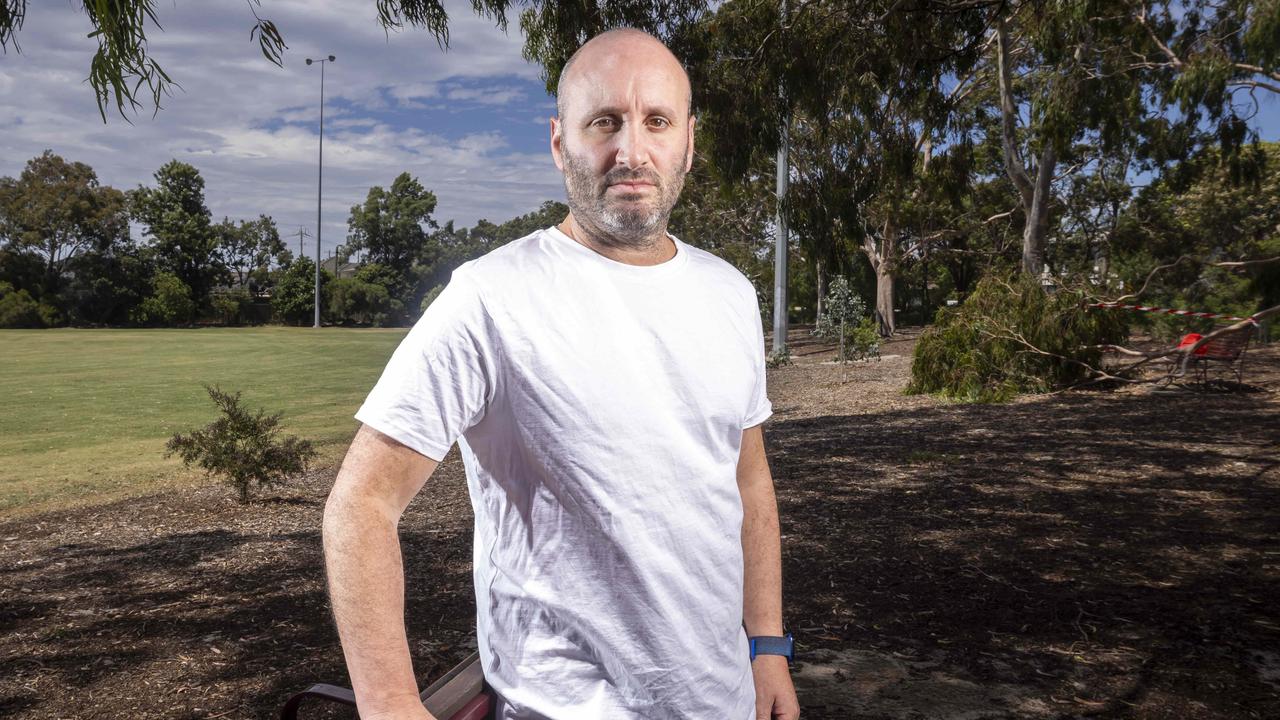
A Meta spokesman told news.com.au the company adopts a “multifaceted approach to tackle scams”.
“Scammers present a challenge in many environments including social media, and they are constantly finding new ways to deceive people,” the spokesman said.
“We use both technology, such as new machine learning techniques, and specially trained reviewers to identify and action content and accounts that violate our policies.”
It said Facebook had removed 631 million fake accounts globally in the first quarter of 2024.
“We partner with local organisations to educate consumers to spot and avoid scams and bring enforcement action against scammers.”
The Meta spokesman did not confirm whether the scams Lindsay and Andrea fell for have been removed from Facebook.
ACCC warns Meta over scams
It comes after the Australian Competition and Consumer Commission (ACCC) alleged earlier this year over half of the cryptocurrency-related ads appearing on Facebook, either violates the platform’s advertising policies or involves scams.
The ACCC had launched a case against Meta over celebrity scam ads in 2022.
In a ruling issued earlier this month, it was revealed ACCC alleged “Meta has been aware that a significant proportion of cryptocurrency advertisements on the Facebook platform have used misleading or deceptive promotional practices” since at least January 2018.
ACCC chair Gina Cass-Gottlieb warned Meta over its handling of scams in March.
Speaking ahead of the launch of the regulator’s new enforcement priorities, Ms Cass-Gottlieb said the regulator wanted social media platforms to establish a mandatory internal dispute-resolution process to ensure consumers can contact a team member when raising concerns.
“There needs to be actually somebody to answer them, rather than no one taking complaints and concerns and also there be binding external dispute resolutions so that consumers can get redress,” she said.
“We do want the code to take account that if a company does business in Australia that they need to be accessible for Australian customers within Australia.”
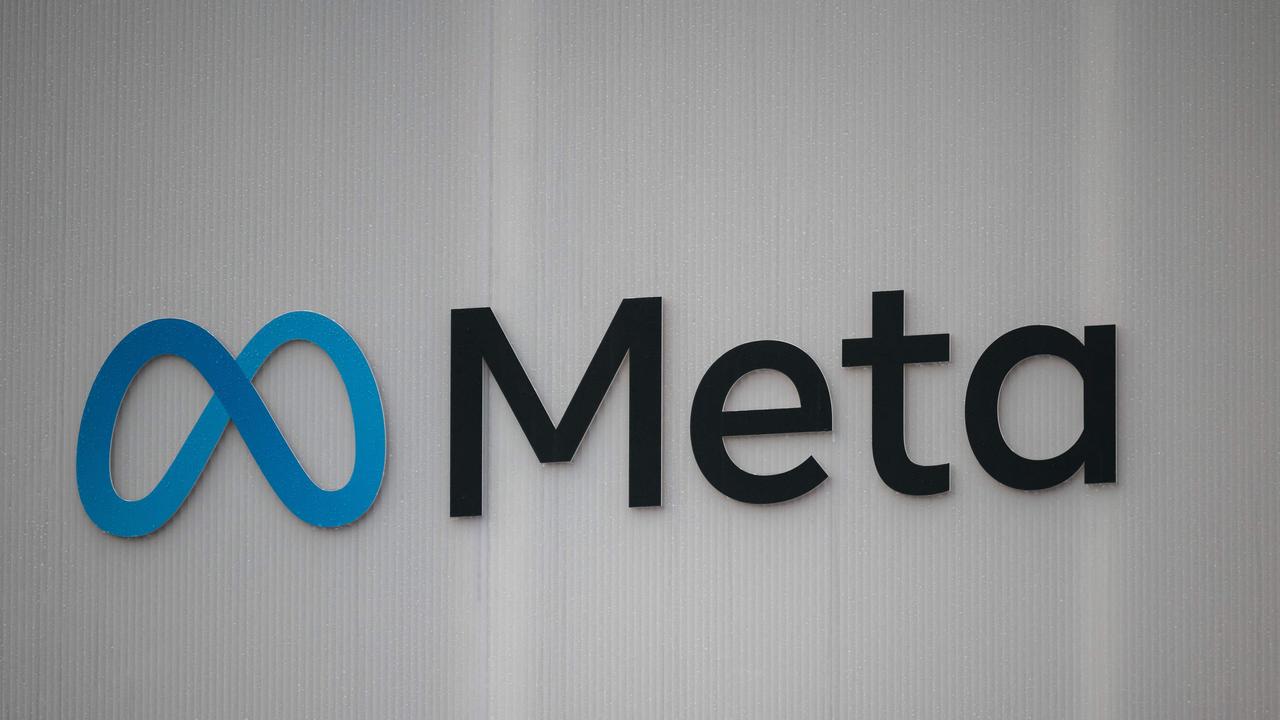
Westpac has also accused Meta of failing to deal with scams.
According toThe West Australian, Westpac customer and corporate services group executive Carolyn McCann wrote a letter Meta earlier this month, urging the company “to review the way the Facebook platform is being used to scam ordinary Australians”.
The bank noted 360 scam incidents have taken place since October last year.
Online shopping scams
According to ScamWatch, there have been 10,200 online shopping scams and 5600 reports of classified scams, so far in 2024, costing Aussies over $5.5 million combined.
ScamWatch warned Aussies to keep an eye out for online sellers who offer products at an unbelievably low price, or don’t have any terms and conditions, ABN or privacy policy on their website, among other warning signs.
“Check that a website you want to buy from has information about privacy, terms and conditions of use, dispute resolution and contact details, plus a secure payment service like PayPal or credit card,” it writes on its website.
News.com.au has contacted Info@mallhelpcenter.com for comment.






